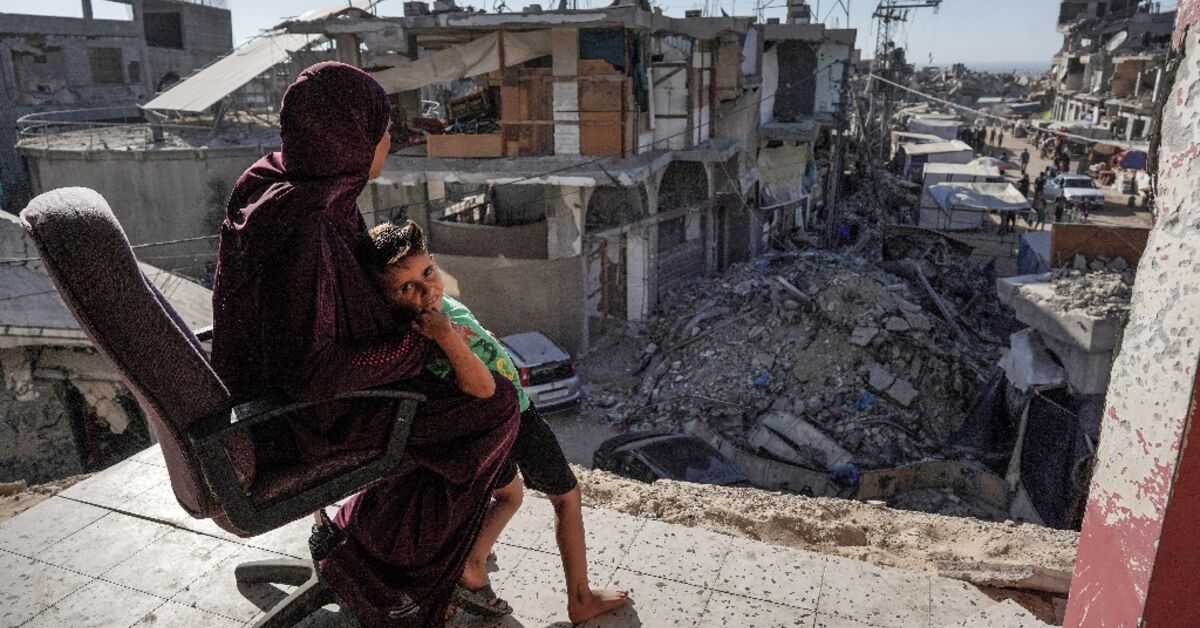Palestinians on Thursday mourned relatives killed in overnight Israeli strikes in the Gaza Strip, where Israel’s prime minister has vowed to intensify the pressure on militants even as demands grow for him to reach a deal that would free hostages.
AFPTV images showed mourners at Al-Aqsa Martyrs Hospital in Deir el-Balah city, where several white-shrouded corpses lay on the ground. One man cradled the covered body of a child.
Rescuers confirmed several people had been killed in separate Israeli strikes in central Gaza.
At the hospital, Ahmed Abu Muheisen said one strike had targeted his cousin’s family in the Al-Zuwaida area.
“His children and his wife were martyred and so was he,” Muheisen said.
“Enough, enough already!” said another mourner, Eid Abu Rakab.
In Israel too, there are similar calls.
Anti-government demonstrators, sometimes marching by the tens of thousands, and separate rallies by families and other supporters of hostages held by Hamas, have stepped up their actions demanding the government reach a deal to free the captives.
“We feel this is a critical moment,” Osnat Sharabi Matalon, two of whose brothers were taken hostage, said at a protest on Wednesday in Tel Aviv.
She said they demand a deal before Prime Minister Benjamin Netanyahu travels to the United States, where he is scheduled to address Congress on July 24.
– ‘By the throat’ –
During the more than nine months of war, Netanyahu has consistently vowed to eradicate Hamas and bring home all the hostages.
On Tuesday he said “we are hurting” Hamas and this is “exactly the time to increase the pressure even more.”
He told parliament: “We have got them by the throat.”
Far-right members of his governing coalition, including National Security Minister Itamar Ben Gvir, oppose a truce deal. On Thursday Ben Gvir said Netanyahu must not make a “surrender” accord with Hamas.
The war began with Hamas’s unprecedented October 7 attack on Israel which resulted in the deaths of 1,195 people, mostly civilians, according to an AFP tally based on Israeli figures.
The militants also seized 251 hostages, 116 of whom are still in Gaza including 42 the Israeli military says are dead.
Israel’s military retaliation has killed at least 38,848 people, also mostly civilians, according to data from the health ministry in Hamas-ruled Gaza.
The latest toll issued Thursday included 54 deaths in the past 24 hours, it said.
All health facilities in southern Gaza have been pushed to “breaking point” due to an influx of people wounded by Israeli bombardments, the International Committee of the Red Cross said on Thursday.
On Saturday Gaza’s health ministry said at least 90 people were killed and 300 injured at the Al-Mawasi camp for displaced people. Israel said it was targeting military commanders behind the October 7 attack.
– Unbearable –
European Union chief Ursula von der Leyen on Thursday emphasised global concern over civilian casualties.
“The people of Gaza cannot bear any more, and humanity cannot bear any more,” she told the European Parliament in Strasbourg, France.
She called for “an immediate and enduring ceasefire,” release of hostages, and preparation “for the day after”.
The United States, Arab governments and others support steps towards the creation of a Palestinian state after the fighting ends.
But UN Secretary-General Antonio Guterres said Wednesday that Israeli steps to extend sovereignty in the occupied West Bank were “driving a stake through the heart of any prospect for a two-state solution”.
Washington has been pushing for a truce deal between Israel and Hamas since President Joe Biden released details of what he said was an Israeli ceasefire roadmap on May 31.
But despite the efforts of Egyptian and Qatari mediators, indirect negotiations between the foes have not yet led to a final a deal. Biden last week said there were “still gaps to close” but progress was being made.
A senior Hamas official said Sunday that the group was suspending participation in talks, partly because of Israeli “massacres against unarmed civilians”, but was ready to return if Israel’s attitude changes.
The war has destroyed much of the coastal territory’s housing and other infrastructure, leaving almost all of the population displaced and short of essential goods.
Pax, a Dutch activist group, said in a study released Thursday that “continuous bombing and Israel’s fuel blockade have decimated” Gaza’s outdated waste collection system, threatening water supplies and farm land.
For Umm Nahed Abu Shar, 45, staying in a tent with her family in Deir el-Balah, this means clouds of flies, mosquitoes, the stench of sewage and constant illness.
“We are not living,” she said.
The US military announced that its problem-plagued mission to deliver aid to Gaza via a temporary pier built by US personnel had officially ended.
burs-it/dv
